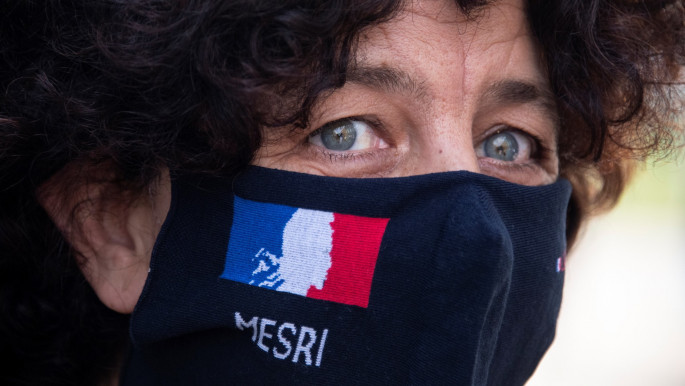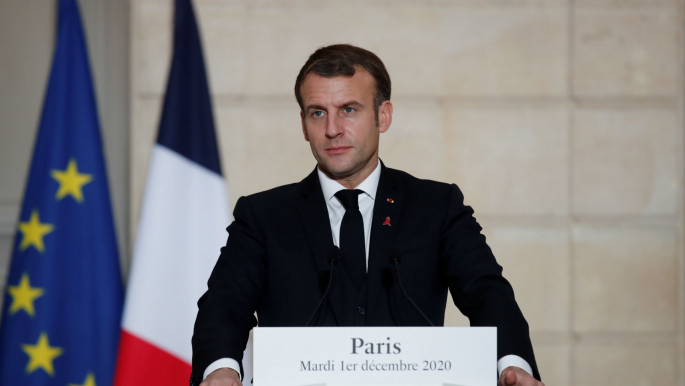France's Generation Identity: The new face of Europe's far-right movement
French Interior Minister Gérard Darmanin announced on 13 February that the government had started the process to dissolve Generation Identity (GI), after several activist events against migrants in France were defined as "incitement to discrimination, hatred or violence towards a person or a group of people because of their origin", according to the Code of Internal Security.
As part of their shock tactics, around thirty activists from the group deployed cars and drones at the French border with Spain on 26 January in order to "monitor the border" and prevent migrants from crossing it illegally through a campaign called 'Defend Europe'.
Since its foundation, GI has conducted high-profile operations which have served as publicity stunts. In 2019, over one hundred activists dressed as police officers set up plastic fences in the Alps along the Italian border, a crossing point for migrants, to protest against immigration.
Two helicopters were used to patrol the border and a huge banner reading: 'Closed border: You will not make Europe home. No way: Back to your homeland' was unfurled on the mountainside.
 |
Generation Identity's dissolution is happening in the midst of a particularly tense social moment in France, with a heightened political focus on the country's Muslim citizens |  |
Three members were sentenced to six months in prison. The movement also put up a banner reading 'Justice for the victims of anti-white racism. White Lives Matter' on 13 June, 2020 on a balcony overlooking an anti-racist demonstration in Paris.
"I don't think its dissolution will have a big effect," Jean-Yves Camus, associate researcher at the French Institute for International and Strategic Affairs (IRIS), told The New Arab. "Those groups usually gather again in a new movement or join another group. Some will definitely drop it, but most will continue. I think it's more a political sign from the government, that it's watching the far-right."
GI evolved from two other far-right groups, Radical Union (Unité Radicale), an anti-Semitic and pro-Nazi organisation dissolved in 2002 after one of its members attempted to kill then-president Jacques Chirac, and far-right political party Identity Bloc (Bloc Identitaire), from which they separated in 2016.
 |
|
| Read more: 'Islamo-leftism': a sinister word meant to smear and silence French academics |
"Some people who want its dissolution are afraid that some members could turn to terrorism, but that can come from all those kinds of movements, not just Génération Identitaire. If there was a terrorist attack soon, it would come from individuals who are part of smaller groups that are less into media communication, and who think this way of activism is not radical enough", Camus said.
"I have the feeling that Darmanin took this decision to 'balance' a bit the government's image after his debate with Marine Le Pen."
Marine Le Pen, president of the far-right party National Rally (Rassemblement National) and known for her strong stance against immigration, was told mockingly by Darmanin on 11 February that she was "a little soft" on Islamism. The debate was about the new anti-extremism bill recently approved in the National Assembly that aims to fight "Islamist separatism", giving the state new powers to limit speech and religious groups. Critics say it stigmatises Muslims and is an attack on religious freedoms.
Whilst Marine Le Pen and even the government of French President Emmanuel Macron are discussing ideas and polices to control legal immigration and the French Muslim community, groups such as GI talk about "remigration", or sending people "back" who are not European, because assimilation is not possible according to their beliefs. Their prime target is the Muslim community, rooted in their belief in the 'Great Replacement' theory popularised by French author Renaud Camus in 2011, which states that the white European population is being replaced by non-Europeans coming mainly from the Middle East and North Africa.
 |
When it comes to racism and Islamophobia in France, it seems easier for the government to target small groups already on the media's radar, rather than targeting the root of the problem |  |
GI's predecessor, Identity Bloc, has also inspired and communicated with other groups, especially in Germany and Austria, in effect creating a pan-European movement. "It was possible to expand abroad because they have this idea of identity based on three levels: local and regional, French, then the European civilisation above", Camus explained to The New Arab. "So they are not very nationalist, they refer to antiquity, the German tribes and the Vikings, among others. For them, this European identity has to be protected."
Generation Identity's dissolution is happening in the midst of a particularly tense social moment in France, with a heightened political focus on the country's Muslim citizens. In addition to the anti-extremism bill, the minister of higher education warned about "Islamo-leftism" in the country's academic institutions and said it was "infecting the whole society". The term is often used in France by far-right politicians as a pejorative against the left. On Sunday, French MP Guillaume Peltier said in an interview that he wanted to propose a law stating that France is a "secular republic with a Judaeo-Christian tradition".
 |
|
| Read more: Macron reminds France's Muslims that liberty, equality and fraternity are not for everyone |
"We are currently living through a social, political and media sequence which is part of the long French history of postcolonial relations in which 'a Muslim problem' has arisen," Kaoutar Harchi, a sociologist at Cerlis laboratory at Paris-Descartes university, told The New Arab. "Or the idea that the presence of a Muslim population, supposed or real, on French territory would threaten the security and identity of the nation," she added.
"The bill on separatism, inspired by Emmanuel Macron, who mentioned this separatist threat in his speech at Les Mureaux in October 2020, attests to a stigmatising, disciplinary and punitive use of the value of secularism. State Islamophobia and the constitution of a Muslim religious affiliation, supposed or real, as social infamy, and as a justification for unequal treatment, are very intense."
When it comes to racism and Islamophobia in France, it seems easier for the government to target small groups already on the media's radar, rather than targeting the root of the problem. "How can we recognise a social group's experience of structural discrimination if it is constantly perceived and treated as guilty, as an enemy to be chased and punished?", asks Harchi.
Florence Massena is a freelance journalist based in Norway after six years spent in Lebanon. She reports on the environment, women's issues, human rights and refugees in the Middle East, Africa and Europe.
Follow her on Twitter: @FlorenceMassena





 Follow the Middle East's top stories in English at The New Arab on Google News
Follow the Middle East's top stories in English at The New Arab on Google News


